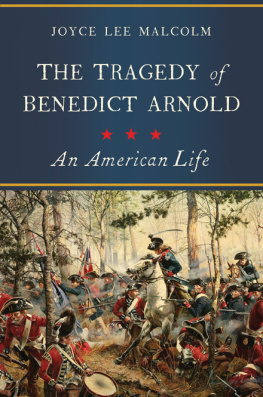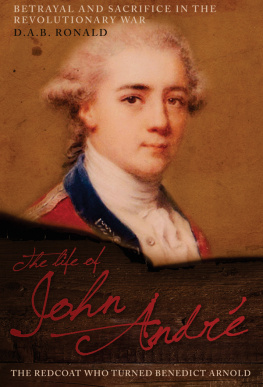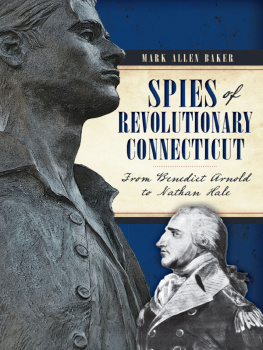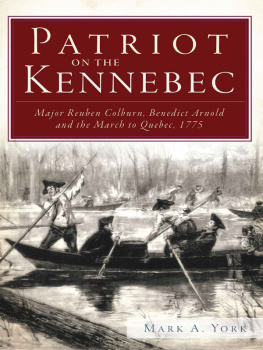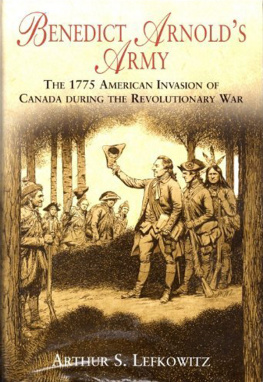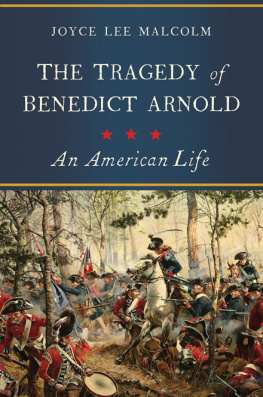
THE TRAGEDY of
BENEDICT ARNOLD

An American Life
JOYCE LEE MALCOLM

PEGASUS BOOKS
NEW YORK LONDON
To My Children
Mark, Lisa Arienne and George
With Love
Honor is like an island.
Steep and without shore:
They who once leave,
Can never return.
Nicholas Boileau cited as a reminder by
Capt. Johann Ewald, Diary of the American War, May 17, 1781
... I have suffered, in seeing the fair fabric of reputation, which I have been with so much danger and toil raising since the present war, undermined by those, whose posterity (as well as themselves) will feel the blessed effects of my efforts...
Benedict Arnold, summation at
his court-martial, January 1780
Treason! Treason! Black as hellThat a man so high on the list of fame should be guilty as Arnold, must be attributed not only to original sin, but actual transgression.... We were all astonishment, each peeping at his next neighbor to see if any treason was hanging about him: nay, we even descended to a critical examination of ourselves...
Adjutant General Colonel Alexander Scammell,
eight days after Arnolds flight
T wo centuries after Benedict Arnolds death the most infamous man in American history remains a two-dimensional caricature in the minds of most Americans: wicked, self-serving, and greedy. Numerous books have now cast his young wife Peggy as equally evil, an Eve tempting her husband into treason. Yet Arnold repeatedly risked his life and sacrificed his fortune for the patriot cause. As for Peggy, the charges against her are based on flimsy evidence contradicted by her own actions, by eyewitness accounts, and by the historical record. Replacing the cardboard cutouts that pass for historical portraits of Arnold and Peggy with a more authentic picture makes their actions, if still culpable in Arnolds case, at least more understandable; exonerates Peggy; and exposes the bitter animosities within the patriot party. It also helps us make sense of the wild fury that greeted Arnolds betrayal, bringing us closer to the people and frightfulness of that time. That task is the aim of this book.
Arnold was a national hero before he abandoned the patriot cause, and no wonder. He has been reckoned the most brilliant officer on either side of the Revolutionary War. He had that rare ability to inspire men to follow him into the face of death, even when, as at the decisive battle of Saratoga, he was stripped of military command. J. W. Fortescue, author of a classic study of the British army, described Arnold as possessing all the gifts of a great commander. To boundless energy and enterprise he united quick insight into a situation, sound strategic instinct, audacity of movement, wealth of resource, a swift and unerring eye in action, great personal daring, and true magic of leadership.
He was courageous, resourceful, and, like most men of his time and rank, keenly jealous of his personal honor. When he joined the British side he forfeited that honor forever. Americans greeted the news of his betrayal with outrage, burning him in effigy, while the British never fully trusted him. His was a tragic fall from fame to infamy. We are left wondering why Arnold abandoned the cause for which he sacrificed his health and wealth, and whywhen so many others did the same, or prudently kept in contact with the British, or simply abandoned the patriot causeArnolds treason has been branded singularly egregious. Contrary to prevailing myths numerous prominent Americans remained neutral, profiteered on the war, preferred the comparative safety of politics to the battlefield, or returned to their families and businesses when their commissions in the Continental Army proved dangerous and thankless. Yet Arnold alone bears the mark of Cain.
Are these questions worth answering? Isnt it enough to know that whatever else he accomplished, the man was a traitor? In the early nineteenth century when Lewis Burd Walker, a descendant of Arnolds second wife, approached publishers about writing a book about Arnold, he was assured no one would want to read about the traitor. Americans enjoy reading about the patriots of the founding era, as an ever growing library of books about them attests. Despite publishers rejecting Walkers proposal, some books have also been written about the traitor. These and other studies that do grapple with why he committed treason and why his actions were deemed so egregious have arrived at various answers.
Arnolds contemporaries and earliest biographers insisted that he was a vicious individualperiod. Jared Sparks, later president of Harvard, set the tone for this wholesale blackening of Arnolds entire life. Sparks finds no tale of Arnolds sinfulness as a child too bizarre to be believed. His The Life and Treason of Benedict Arnold, published in 1835, informed readers that one of Benedict Arnolds earliest amusements was to snatch baby birds from their nests in order to maim and mangle them in sight of the old ones, that he might be diverted by their cries. Here was a thoroughly bad child destined to mature into a very bad man. Arnolds military achievements had already been dismissed by his personal enemies as merely self-serving, reckless bravado.
This indictment begs the question why Arnold had behaved so heroically and generously. Was the dishonorable treatment he received over and over again from Congress and his rivals mere slights any right-thinking man should have ignored? Or were his attackers, especially those in Congress, anxious to diminish a popular general, frightened Arnold might copy Oliver Cromwell and seize power? Why the focus on Arnolds supposed flaws anyway? Several later authors have presented a more balanced account, and I am greatly indebted to their work.of Arnolds war correspondence published in 2008, or knew of the cache of Arnolds papers recently discovered in Quebec. None has reevaluated the role of his wife in the treason.
No less than seven recent books focus on the supposed wicked machinations of his beautiful young wife, Margaret Shippen. This trend began in 1941 when Carl Van Doren, in his Secret History of the American Revolution, claimed to have found convincing evidence she was an active promoter of his defection, overturning the long-held belief in her innocence. The daughter of a distinguished, neutral Philadelphia family is now viewed as having inveigled her husband into joining the British cause. Peggy is now nearly as infamous as her husband. However, my reexamination of Van Dorens evidence, along with research into Peggys behavior, presents a compelling case for her innocence. Good story as these new books tell, they have damned an innocent woman. As George Washington, Alexander Hamilton, Peggys family, those who knew her believed, she was not guilty.
A book about Arnolds life and times is well worth bringing to a wider public because the story it tells is so illuminating. It provides a keener understanding of a talented and flawed man and the meaning of loyalty in the revolutionary context, but it also exposes the bitter tensions within the revolutionary cause and the impact of what was a civil war on the lives of ordinary people. Beyond its historical value Arnolds story is a thrilling one. The Tragedy of Benedict Arnold casts a wide net, treating Arnolds personal and public life and the lively cast of characters that peopled his world. The goal is to recover, as far as possible, both the man and his time, and to improve our understanding of both. The aim is not to condone Arnold but to understand why a man who had risked everything for the patriot cause took that desperate decision to turn against it, earning not the success he hoped for, but lasting opprobrium.
Next page
